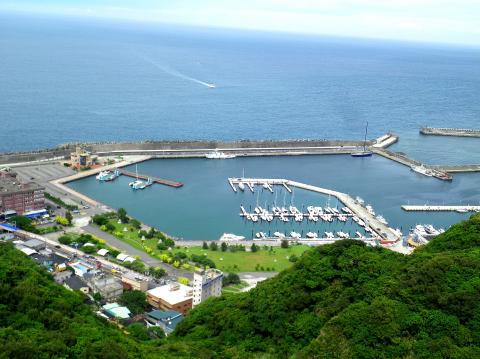In light of the nation’s record-high wealth gap, the Fisheries Agency has come under fire for its plan to spend NT$760 million (US$25 million) to build three ports exclusively for the anchoring of private pleasure yachts rather than taking care of disadvantaged fishermen.
The docks — located inside the fishing docks at Pisha Harbor in Keelung County’s Badouzih (八斗子) area, Greater Tainan’s Anping Harbor and Yilan County’s Wushih Harbor — would increase docking space for yachts by 114 ships, the agency said, adding that the construction of the facilities were in accordance with President Ma Ying-jeou’s (馬英九) “I-Taiwan 12 projects.”
The project is not limited to pleasure yachts from high income people, but anyone can use the docks if they have a yacht, the agency said, adding that “it is like being able to park in a parking lot if there are empty spots.”

Photo: Lu Hsien-hsiu, Taipei Times
For those who have currently anchored their yachts at the dock in Pisha harbor — which aims for an official opening on Sept. 21 — the yachts would be charged NT$20 per tonne, the agency said, estimating that the docks would bring around NT$1.5 million to NT$2 million in revenue per year.
However, the Control Yuan in August last year expressed concern that the agency’s move to construct the yacht docks would only serve to waste public resources and build something that would be rarely used.
Citing statistics from the Ministry of Transportation and Communications’ “Plans on the promotion of yacht events,” the Control Yuan said that there were only 2,500 potential yacht owners in the country, with only 1,600 currently registered. The majority of the boats are registered in Penghu.
The boats are not used for passenger transports or leisure use, the Control Yuan said, adding that yachts registered by owners who are in Taiwan numbered only 200.
There are a total of 328 docking spaces for yachts counting the seven international economic ports, and the 20 fishing ports around the nation, the Control Yuan said, adding that docking space was still abundant.
“Most of the docking ports are either not being used or have a low rate of usage, and we suggest that the agency review the entire construction plan to avoid wasting public money,” it added.
However, Taiwan Yacht Industry Association chairperson Lu Chia-yang (呂佳揚) said that the low rate of usage for yacht ports was because their location is not ideal, which was in part because the nation had not legalized yachting at the time.
“It is becoming a trend to go yachting at sea as a leisure event, and with the passing of the Yacht Regulation Rules (遊艇管理規則) last year, people don’t even need to spend a lot of money and could start with small second-hand yachts going for NT$600,000 to NT$700,000,” Lu said.
Veteran fisherman Ho Chuan-chi (何傳吉), on the other hand, was of the opinion that with fishery hauls only amounting to a third of their former yields, building the docks would be unfair to poorer people.
Chen-Li Task Force for Agricultural Reform chief executive Du Yu (杜宇) added that the large amount of funding being laid down for only 2,500 potential users is unreasonable.
In its defense, Fisheries Agency Deputy Director-General Tsay Tzu-yaw (蔡日耀) said the fishing ports would still prioritize the use of fishing boats, adding that the docking for yachts was only a method to increase work opportunities.
“We have taken the Control Yuan’s reminder to heart and will keep it in mind as we proceed with the project,” Tsai said.

An essay competition jointly organized by a local writing society and a publisher affiliated with the Chinese Communist Party (CCP) might have contravened the Act Governing Relations Between the People of the Taiwan Area and the Mainland Area (臺灣地區與大陸地區人民關係條例), the Mainland Affairs Council (MAC) said on Thursday. “In this case, the partner organization is clearly an agency under the CCP’s Fujian Provincial Committee,” MAC Deputy Minister and spokesperson Liang Wen-chieh (梁文傑) said at a news briefing in Taipei. “It also involves bringing Taiwanese students to China with all-expenses-paid arrangements to attend award ceremonies and camps,” Liang said. Those two “characteristics” are typically sufficient

A magnitude 5.9 earthquake that struck about 33km off the coast of Hualien City was the "main shock" in a series of quakes in the area, with aftershocks expected over the next three days, the Central Weather Administration (CWA) said yesterday. Prior to the magnitude 5.9 quake shaking most of Taiwan at 6:53pm yesterday, six other earthquakes stronger than a magnitude of 4, starting with a magnitude 5.5 quake at 6:09pm, occurred in the area. CWA Seismological Center Director Wu Chien-fu (吳健富) confirmed that the quakes were all part of the same series and that the magnitude 5.5 temblor was

The brilliant blue waters, thick foliage and bucolic atmosphere on this seemingly idyllic archipelago deep in the Pacific Ocean belie the key role it now plays in a titanic geopolitical struggle. Palau is again on the front line as China, and the US and its allies prepare their forces in an intensifying contest for control over the Asia-Pacific region. The democratic nation of just 17,000 people hosts US-controlled airstrips and soon-to-be-completed radar installations that the US military describes as “critical” to monitoring vast swathes of water and airspace. It is also a key piece of the second island chain, a string of

The Central Weather Administration has issued a heat alert for southeastern Taiwan, warning of temperatures as high as 36°C today, while alerting some coastal areas of strong winds later in the day. Kaohsiung’s Neimen District (內門) and Pingtung County’s Neipu Township (內埔) are under an orange heat alert, which warns of temperatures as high as 36°C for three consecutive days, the CWA said, citing southwest winds. The heat would also extend to Tainan’s Nansi (楠西) and Yujing (玉井) districts, as well as Pingtung’s Gaoshu (高樹), Yanpu (鹽埔) and Majia (瑪家) townships, it said, forecasting highs of up to 36°C in those areas